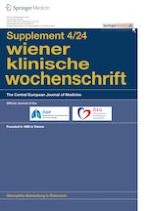Erschienen in:

01.07.2024 | Hämophilie | Leitlinie
Hämophilie-Behandlung in Österreich
verfasst von:
Univ.-Prof. Dr. Christoph Male, MSc, Cihan Ay, Richard Crevenna, Sabine Eichinger, Clemens Feistritzer, Robert Füller, Alexander Haushofer, Andreas Kurringer, Peter Neumeister, Stephan Puchner, Thomas Rettl, Thomas Schindl, Gerhard Schuster, Gerhard Schwarz, Michael Sohm, Werner Streif, Katharina Thom, Barbara Wagner, Eva Wissmann, Karl Zwiauer, Ingrid Pabinger
Erschienen in:
Wiener klinische Wochenschrift
|
Sonderheft 4/2024
Einloggen, um Zugang zu erhalten
Zusammenfassung
Die vorliegende aktualisierte Leitlinie soll einen praxisnahen Leitfaden für die Diagnostik und Therapie von Personen mit Hämophilie (Persons with Haemophilia, PwH) in Österreich darstellen. In der Hämophilie-Therapie gibt es wenige vergleichende Interventionsstudien, daher haben die Empfehlungen einen meist niedrigen Evidenzgrad und beruhen auf einem Expertenkonsensus.
Als wesentliche Grundlage dieser Leitlinie dienen die internationalen Guidelines der „World Federation of Hemophilia (WFH)“ aus dem Jahr 2020. Diese wurden den nationalen Gegebenheiten und Erfahrungen angepasst.
Behandelt werden Diagnostik und Verlaufskontrollen, medikamentöse sowie begleitende Therapieoptionen und Prophylaxe, weiters spezielle Aspekte bei Kindern und Erwachsenen mit schwerer Hämophilie, Messung von Outcomes, die Vorgehensweise bei Traumen, speziellen Blutungen und Eingriffen einschließlich Zahnextraktionen, das Thema Hemmkörper sowie mögliche Probleme bei Konduktorinnen und psychosoziale Aspekte bei Hämophilie.